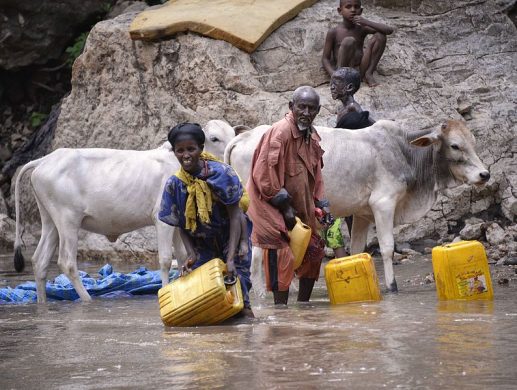Arlington, VA, United States, 5th December 2017 (MAB): An elite advisory group of retired admirals and generals from across the military services has warned that water stress will play an increasingly important role in global security.
In a new report, “The Role of Water Stress in Instability and Conflict,” the CNA Military Advisory Board (MAB) investigates how water stress serves as a factor across the spectrum of conflict — from civil unrest and localised violence to terrorism and insurgencies — that is counter to the interests of the United States and its allies.
“As senior military officers, we see water stress — the lack of adequate fresh water — as a growing factor in the world’s hot spots and conflict areas, many of vital interest to the United States. With escalating global population, demographic changes driving increased food and energy production, and a changing climate, access to fresh water plays an increasingly important role in global security,” said U.S. Air Force Gen. Ron Keys, chairman of the CNA MAB.
Exploited by violent extremist groups
The report not only articulates the role water plays in diplomacy, violence and conflict, but also illuminates how violent extremist organisations such as ISIS, Boko Haram and Al-Qaeda exploit water stress and the conditions it creates to recruit followers, challenge governments, and even as a tool of coercion.
Although wars between states over shared water resources have historically not occurred, the report also highlights that as water stress worsens, particularly in areas where tensions among states already exist, it may increasingly be a source of competition — and potentially even violence — among nations in the future.
A delegation from the CNA Military Advisory Board, including its vice chairman, Vice Adm. Lee Gunn, Gen. Donald Hoffman, and the Royal Navy’s former Commander of U.K. Maritime Forces, Rear Adm. Neil Morisetti, provided a briefing on the report to major institutions in the United Kingdom and Europe, including NATO, the European Parliament and Britain’s National Security Committee, on the national security implications of climate, the changing energy landscape and water stress.
“We must better understand the relationship between water and conflict now to avoid more serious threats to our national security in the very near future,” said Gunn.
Growing national security concern
The CNA MAB recommends that security elements of the U.S. government should regard global water stress as a growing national security concern, as it will be an intensifying factor in instability, conflict and crises that will impact U.S. national interests abroad.
In areas of strategic interest to the U.S. and its allies, the report recommends expanding diplomatic efforts, investment and technical leadership in the mitigation of water stress, as well as incentivising private-sector engagement to spur innovation and improve water management practices.
“Whilst this report looks at the risks posed to U.S. national security as a result of water stress, the findings are equally relevant for the U.K. Of particular concern is the role water stress can play in empowering violent extremist organisations, the consequences of which are often global — a problem that will be exacerbated by the impact of a changing climate,” said Morisetti.
Read the report: www.cna.org/mab/waterstress
Read the summary: www.cna.org/mab/waterstress-
Learn more about CNA’s Military Advisory Board: www.cna.org/mab















